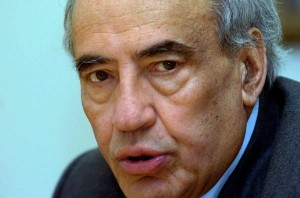
Gregorio Peces-Barba, one of the authors of Spain’s Constitution, and an advocate of the role therein of the monarchy, died on July 24 aged 74 after being admitted to hospital a week earlier suffering from a kidney complaint and heart problems.
From a well-to-do family that backed the losing side in the Spanish Civil War — his father, a lawyer and advisor to the Republican army, was given a death sentence, later commuted — Peces-Barba grew up in Madrid during the harsh years that followed General Francisco Franco’s victory, first attending the Lycée Français with exiled King Simeon of Bulgaria, and then the Complutense University where he obtained first a law degree and then a doctorate.
He began practicing as a lawyer in the dark days of 1962, when the military regime was under mounting internal and external pressure to introduce democratic reforms. A thorn in the side of the dictatorship, over the following 13 years Peces-Barba defended labour leaders, students, political activists, and other opponents of the Franco regime. He also represented members of ETA put on trial in Burgos in 1970 in a case that attracted international condemnation after a military court handed down death sentences to several of the accused. As a result of his pro-democratic activities, Peces-Barba was harassed constantly by the police, and in 1969 was held by the authorities for several days in a remote village in the centre of the country. In 1971, his license to practice was suspended for three months.
Peces-Barba’s experiences as a lawyer led him to become increasingly involved in political activism: aside from his work in defending the regime’s enemies, even terrorists (something that would cause him problems in later years; in 1963 he co-founded Cuadernos para el Diálogo (or, Notebooks for Dialogue), a magazine that provided a forum for left-leaning writers and thinkers, many of whom were living abroad.
With the death of Franco and the gradual transition toward democracy underway, Peces-Barba decided to join the Socialist Party (PSOE). In 1976 he was elected vice president of the 272nd PSOE conference, the first to be held in Spain since the 1930s.
Over the next decade, Peces-Barba went on to become party secretary, a post he served in until he resigned in 1981. The following year he was re-elected as the representative in the lower house for Valladolid, and later the same year voted in as speaker of the house. At the end of the legislature in 1986, he left politics and returned to the academic world, this time to help set up the privately run Carlos III University, serving there as rector from 1990 to 2007.
A constitutional legacy
But it is his contribution, along with six other representatives of the main parties in Spain — including the Socialist Party’s Catalan leader, but no direct involvement for the Basques — to the writing of the Spanish Constitution that he will be remembered.
Since then, a political consensus has existed not to criticize the Constitution, on the basis that it was the only attainable compromise and therefore the best possible charter.
At the centre of the project was the role of King Juan Carlos — whom Franco had brought from exile in Portugal in the early 1960s with a view to moulding him as the country’s future leader — as guarantor of a democratic Spain.
Speaking earlier this year in light of the brouhaha surrounding Juan Carlos’s hunting accident, Peces-Barba made clear his fondness, and respect, for the king and the importance of the continuing role of the monarch as head of state. He seemed untroubled by the lack of transparency of the king’s affairs or the wider issue of Spain’s lack of a Freedom of Information Act.
Similarly, over his career he evaded the issue of whether the Constitution needed updating in relation to the demands of Catalan and Basque nationalists for greater independence.
In 2004, the year of the Madrid train bombings, the Socialist government named Peces-Barba High Commissioner for the Attention of Victims of Terrorism, but he resigned the post in 2006 following criticism from the Association of Victims of Terrorism (AVT). He refused to state publically that the AVT’s hostility towards him, with the connivance of the Popular Party, seeking to paint him as a less-than-honest broker, given his legal work on behalf of ETA activists during the dictatorship, had been a factor, saying simply that he wanted to return to teaching.
His career as a university professor began in 1966 at the Complutense in Madrid, where he taught philosophy of law. In 1982, through competitive public examinations, he obtained the post of senior lecturer in philosophy of law and natural law. Later, he would head the department.
Among many honours bestowed on Peces-Barba were the Collar of the Order of Civil Merit, the Great Cross of the Order of San Raimundo de Peñafort, the Medal of Honor with the rank of Great Cross and the Légion d’Honneur.
Leave a Reply
You must be logged in to post a comment.